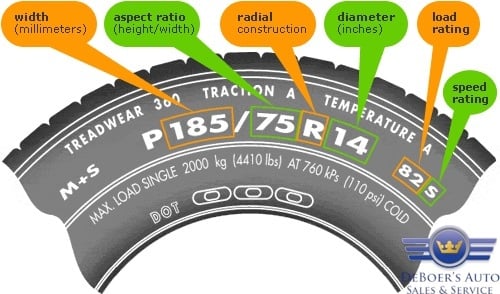If you’re like most drivers, your knowledge about vehicle tires is limited. However, when it comes time to replace the tires on your car or truck, knowledge is power. Before you go tire shopping, take time to evaluate your driving habits, the environmental conditions your tires likely will be subjected to and your budget. The adage, “you get what you pay for,” certainly applies to tires. Sure, even the cheapest tires will suffice to get you from point A to point B, but skimping on quality will affect your ride quality and, more importantly, your ability to adeptly handle your vehicle.
How to Select the Right Tire for Your Driving Needs
Since choosing the right tire improves the ride and handling of your car, it’s in your best interest to select wisely. Before you tire shop, you’ll need to know the basic tire specifications for your vehicle, such as tire type, size, speed rating and load capacity, for example. (Consult our blog posts, “How to Tire Shop - Steps 1 and 2” for specifics.) Beyond these basics, know which of the following tires best suit your driving habits.
Car and SUV Tires
- Passenger: Providing longer wear and equating to a lower cost per mile over time, these value tires are a smart option across the board.
- Highway: These tires are designed with a special rib that yields a quiet ride, while increasing tread life.
- Touring: These hybrids blend outstanding ride quality with improved performance over all-purpose tires.
- High-performance: These tires provide heightened stability and handling at high speeds.
- Symmetrical: These tires' tread patterns are identical on both the inner and outer part of the tire. This is the most common design for vehicle tires because it's the longest-lasting.
- Asymmetrical: The inner and outer tread patterns on these tires are different. This difference yields better performance and are commonly used on high-end sports cars.
- All-season: The default tires on most cars, these models are a dependable choice in moderate climates not prone to extreme winter conditions.
Truck Tires
- All Terrain: Probably the most popular truck tire, these tires provide greater off-road traction with a slight trade-off in highway comfort.
- Mud Terrain: These are the highest-traction tires that are still highway-driving approved.
- Light Truck: These tires provide better grip and outstanding handling in all weather conditions, yet are heavier-duty than passenger tires so they can handle off-road conditions effectively.
Your ideal tires will depend on your percentage of highway driving versus more aggressive driving conditions. If your priority is to achieve outstanding comfort and handling, touring tires may be your best option. If you drive a sports car and wish to maximize performance, high-performance tires fit the bill. If you drive an SUV, begin your search in the SUV tire section. Many drivers who have trucks, prefer all terrain tires for better traction in different driving conditions.

What to Know If You Live in a Cold Climate
One of the most puzzling predicaments many tire shoppers face is whether they need snow or winter tires. Contrary to popular belief, there is a difference between snow tires and winter tires. That difference has to do with traction. Winter tires feature a knobby exterior tread designed to power through slushy mud and snow. Snow tires (you’ll see a snowflake symbol on a tire’s sidewall) have been certified by the American Society for Testing and Materials to achieve superior scores on traction tests. (Snow tires’ traction scores are 110-plus as compared to 100 scores for all-purpose tires.) This extra traction is especially beneficial when driving in severe winter weather characterized by slick, packed snow. Do you need snow tires or winter tires? That depends on how much snow falls in your area and how long it stays on the ground. It is all determined by how cold it gets where you live.
The Best Tires Come with a Warranty
If you’re located in Sussex County and will be buying new tires soon, contact us at DeBoer’s Auto. We’ll help you select the ideal tires for your car and driving habits, and sell them to you at the lowest available price. We also have Road Hazard Protection available.









